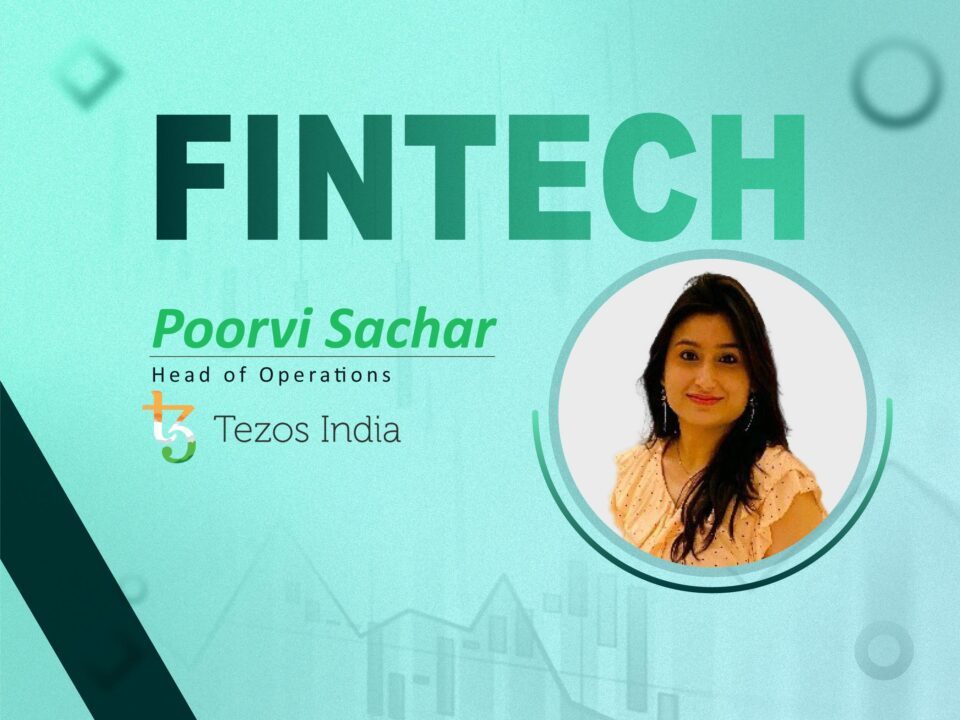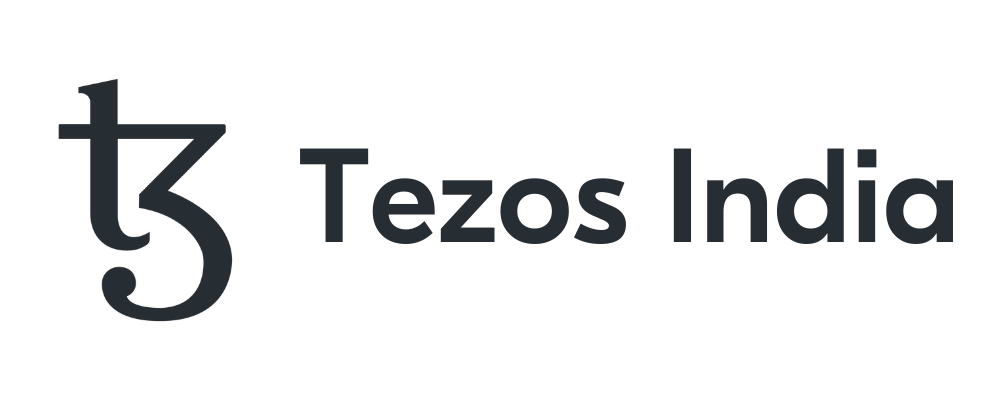Please tell us about your fintech journey so far.
I moved to Bengaluru (BLR) in 2020 and started working as a strategy advisor for Shell, when I learned about the De-fi idea. I became interested in it because of its potential and dug further by investigating several De-fi systems. My skills in coding and financial management also helped me understand its nuances.I began my journey into web3 with three years of coding experience under my belt, starting with a firm grasp of the foundations and practical coding in Solidity and SmartPy.
I joined Tezos India as the Developer Relations lead in early 2021, and I then became a part of the web3 ecosystem. This signaled my entrance into the realm of cryptocurrency, including Defi and NFTs, and it sparked additional interest in blockchain technology. At Tezos India, I created Tezos clubs in colleges, taught more than 5000 developers, ran more than 100 workshops, and planned events, including the incredibly popular TEZASIA, which attracted more than 11,000 participants the previous year. I also provided support for a number of Tezos projects, helping to build a strong developer pipeline.
In addition, nf3 exchange, a safe and user-friendly platform for NFT bartering, trading, and swapping, was founded by me as a result of my interest in NFTs. Since then, I have worked hard in this area, creating products and solutions, managing people, and deepening my expertise to obtain a thorough grasp of the real-world problems this technology can solve.
Could you explain how blockchain can be used as an alternative option to the traditional digital payment sector which is not accessible to large numbers of people in the emerging economies?
Blockchain technology provides a substitute for conventional digital payments, particularly in developing nations. By enabling direct access to financial services without middlemen, it encourages financial inclusion. Costs are decreased, borderless payments are made possible, security and transparency are improved, credit is easier to get, and issues with identity verification are resolved. In general, blockchain offers a huge number of individuals in emerging economies secure, affordable, and accessible financial services.
Also Read: Global Fintech Interview with Diallo Gordon, CPO & CMO, Digital Payments at Passport Technology
The value of all existing cryptocurrencies is around $919 billion, with around $389 billion of that being Bitcoin which is more than 40%; what are your comments on this?
The fact that the total value of all cryptocurrency in existence is about $919 billion, with $389 billion or more representing more than 40% of that value, shows how dominant the market is for Bitcoin. This demonstrates how widely used and recognized Bitcoin is as the top cryptocurrency. It’s crucial to remember that the bitcoin market is quite volatile and prone to changes.
Although Bitcoin commands a substantial percentage of the market, the situation may alter as other cryptocurrencies gain popularity or as new technologies advance. In order to make wise judgements, investors and fans regularly track these market movements.
Hackers attack people worldwide roughly every half a minute. What is your USP to deal with digital fraud?
Implementing sophisticated security measures, using fraud detection systems, teaching users about online security, regularly monitoring and analyzing activity, working with industry partners, and adhering to relevant rules are all effective ways to prevent digital fraud. The fight against online fraud is a continuous process that calls for constant strategy revision to keep up with new threats.
Can you discuss a little on some of the latest innovations in the blockchain domain that have helped reduce fraud while increasing overall security and compliance of payments wallet systems?
Smart contracts, immutable transaction records, tokenization, consensus methods, improved identity verification, and transparent transactions are just a few of the blockchain’s advances that have helped to lower fraud and boost security and compliance in payment wallet systems. These developments take advantage of blockchain’s features to improve payment systems’ integrity, transparency, and dependability.
Also Read: Global Fintech Interview with Sankaet Pathak, CEO at Synapse
As one of the world’s foremost blockchain experts, what advice would you like to give our 420 million global crypto investors?
- Conduct extensive research: Before making a crypto investment, it’s crucial to understand the team, market trends, technology, see the use cases which the project/protocol is offering and potential hazards. Making better educated investing selections is possible when you are well-informed.
- Develop a diverse portfolio: Investing in a variety of cryptocurrencies can help spread out your risk and lessen the effects of volatility. By diversifying, you might perhaps gain from the expansion of several enterprises.
- Be reasonable in your expectations because cryptocurrency values are prone to extreme volatility. Setting reasonable goals and preparing for market fluctuations are essential. Steer clear of making snap judgements based just on momentary price changes.
- Protect your financial assets: To secure your bitcoin assets, put in place strong security measures. Utilize encrypted wallets, turn on two-factor authentication, protect your private keys, and keep an eye out for phishing schemes.
- Keep up with market trends, legislative changes, and recent news in the bitcoin industry. You can make smarter financial choices and successfully react to market shifts by being well-informed.
- Consult a certified financial advisor who specializes in cryptocurrencies if you lack knowledge or have questions regarding investing techniques. They may provide you personalized advice depending on your unique situation.
Keep in mind that buying cryptocurrency entails risk, and the market may be quite unstable. It’s crucial to use prudence, research your options, and only invest money you can afford to lose.
We have seen peaks and valleys in the blockchain domain in the last couple of years. What are your predictions for the next 5 years?
Due to a number of circumstances and uncertainties, it is difficult to predict the future of the blockchain industry. However, some patterns over the following five years may be predicted based on prior data. With expanded acceptance across industries, improved scalability, and enhanced user experience, the blockchain industry is anticipated to continue expanding.
As integration with current systems becomes more simple, organizations will be able to take advantage of blockchain benefits. Regulations will become more established, bringing stability and increasing institutional involvement. With the adoption of the technology by sectors including supply chain management, healthcare, voting systems, and DeFi, blockchain applications will go beyond cryptocurrency.
Blockchain platform interoperability will become more important, encouraging cooperation and innovation. Sustainable solutions will receive more attention as a result of environmental issues associated to bitcoin mining. Given the dynamic nature of the blockchain realm, it is imperative to take these projections with caution. The future of the sector will be shaped by the actual advances during the following five years.
Also Read: Global Fintech Interview with Michael Rangel, Founder and CEO at Novo
Please tell us about the future you foresee for the B2B space in other relatable industries that you plan to dive into.
Several B2B industries have the potential to use and utilize blockchain technology. Blockchain technology may improve transparency and traceability in the supply chain by automating product tracking and verification. Blockchain technology may be used by the healthcare sector to securely store and share patient information, enhancing privacy and interoperability.
Energy and utilities can investigate blockchain for grid management, peer-to-peer energy trading, and the adoption of renewable energy. Blockchain technology has the potential to revolutionize the administration of intellectual property by establishing transparent and unchangeable records of ownership and licensing.
Smart contracts can help the real estate industry by streamlining procedures and ensuring the security of transactions. Blockchain technology has the potential to speed up international payments, lower the risk of fraud, and streamline contractual obligations in the financial services industry. Nevertheless, the actual adoption of blockchain in these sectors is dependent on a number of elements, including legislative frameworks, technological developments, and industry-specific difficulties.
Thank you, Poorvi ! That was fun and we hope to see you back on globalfintechseries.com soon.
[To share your insights with us, please write to sghosh@martechseries.com]
Poorvi Sachar is Head of Operations at Tezos India – a non-profit organization that enables people and entities in India to use the Tezos blockchain.
Poorvi is a techie at heart. Having spent several years helping organizations optimize their operations and scale up their business, data analytics and technology comes naturally to her. She was born and brought up in Agra, and from her young age, had a keen interest in technology, software and start-ups. She completed her B. Tech in Information Technology from Motilal Nehru National Institute of Technology, Allahabad, and went ahead to work in Kronos Solutions as Software Developer for 2+ years where she gained hands-on experience in Big Data, Hadoop development and Workforce Management. Armed with her industry experience, she went on to do MBA from Faculty of Management Studies, Delhi in 2018.
Tezos India is a blockchain adoption startup based in Bengaluru and funded by Tezos Foundation to grow the Tezos ecosystem in India. As a vibrant community, Tezos India actively supports developers, entrepreneurs, and enthusiasts, offering resources, education, and opportunities to collaborate on groundbreaking blockchain projects. Tezos India is committed to leveraging the Tezos network’s secure and scalable infrastructure to unlock new possibilities and drive transformative change.

